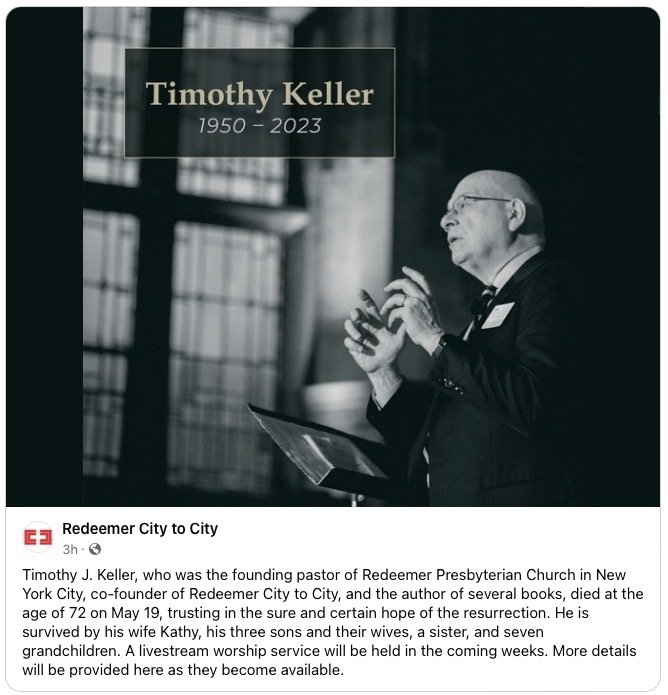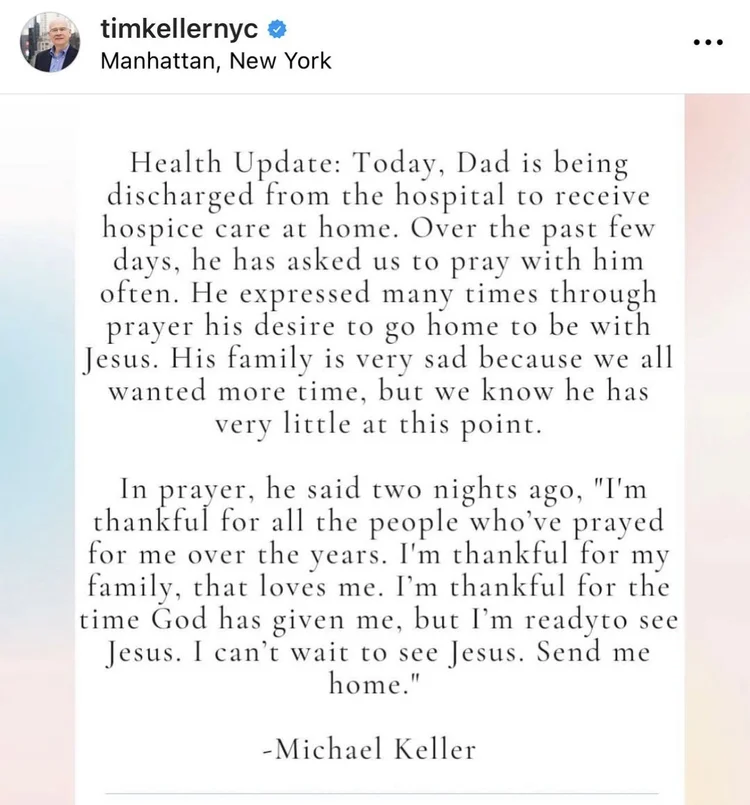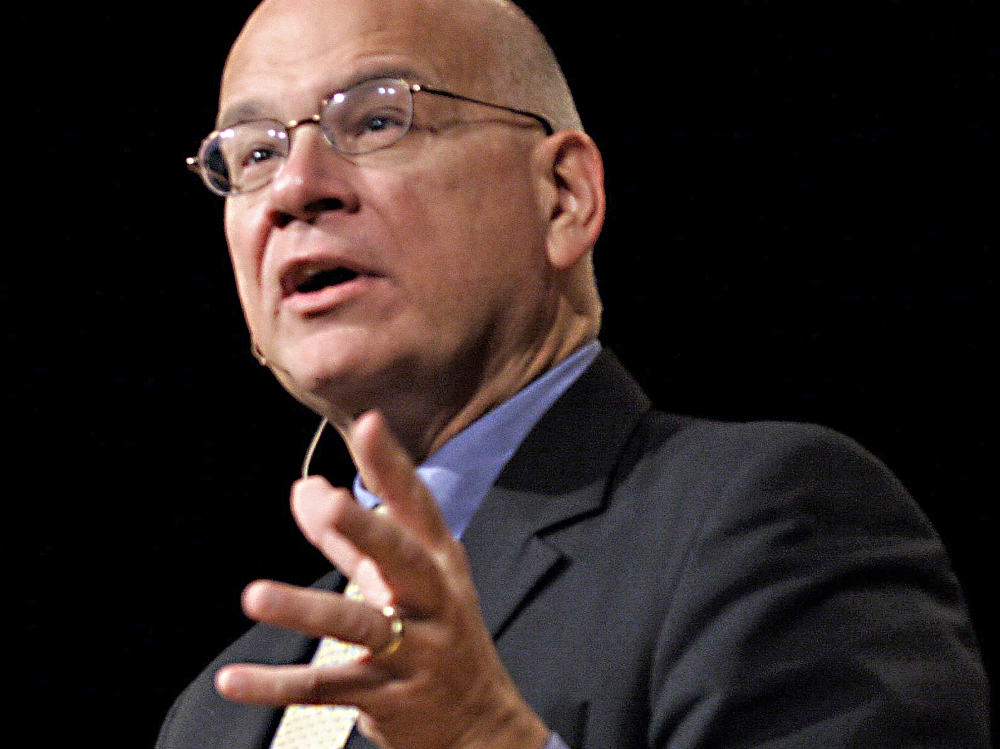By Rafa Oliveira Religion Unplugged
Timothy Keller, founding pastor of Redeemer Presbyterian Church, has died at age 72. He passed peacefully in his home in New York City on May 19 of complications from pancreatic cancer.
Keller had been receiving treatment for pancreatic cancer since 2020 and was hospitalized earlier this week following complications from his medication. On May 18, he was discharged and placed in hospice care.
He remains famous for his dedication to and passion for urban ministry. Once a seminary professor, Keller planted Redeemer in New York City in the early 1990s and ministered to the arguably unchurched elite of Manhattan in New York City. In rented auditoriums, Keller preached in professorial style to thousands of young professionals and families. The services and locations multiplied around Manhattan. Before long, Redeemer planted dozens of churches in other cities. In his later years as a pastor and into retirement, Keller wrote bestselling books and remained active in public life.

A preface to one of Keller’s essays in Christianity Today noted that the pastor will go down in history as a pioneer of Christian renewal in cities. “Fifty years from now, if evangelical Christians are widely known for their love of cities, their commitment to mercy and justice, and their love of their neighbors, Tim Keller will be remembered as a pioneer of the new urban Christians,” it read.
“We are forever grateful for his leadership, heart, and dedication to sharing the love of Christ with others,” Redeemer said in a statement. “While we will miss his presence here, we know he is rejoicing with his savior in heaven.”
Keller’s son, Michael, had been keeping the public up to date on his father’s health by posting on Keller’s Twitter before his eventual passing.
“Over the past few days, he has asked us to pray with him often,” Michael tweeted on May 18. “He expressed many times through prayer his desire to go home to be with Jesus. His family is very sad because we all wanted more time, but we know he has very little at this point.”
Tim Keller had first announced his diagnosis in June 2020 in a Facebook post, declaring, “I have terrific human doctors, but most importantly I have the Great Physician himself caring for me. Though we have had times of shock and fear, God has been remarkably present with me through all the many tests, biopsies, and surgery of the past few weeks.”

Keller was born in Allentown, Pennsylvania, in 1950 to William and Louise Clemente Keller. He grew up attending a Lutheran church. As a student at Bucknell University in the late 1960s, he got involved with InterVarsity Christian Fellowship. He became a voracious reader of British authors such as John Stott and C.S. Lewis.
Keller attended Gordon-Conwell Theological Seminary, where he met another student named Kathy Kristy, who later became his wife in 1975. Keller was ordained in the Presbyterian Church of America, a denomination founded in Birmingham, Alabama, and with only 300 congregations at the time. He became a pastor of a PCA church in Hopewell, Virginia, just south of Richmond.
“In a small town, people will follow you if they trust you — your character — personally, and that trust has to be built in personal relationships,” he told World magazine. He said he learned to build a ministry not just by leadership charisma or preaching skill but my loving people and “repenting when I was in the wrong.”
After nine years in Virginia, he moved to Pennsylvania to teach practical theology at Westminster Theological Seminary. He also consulting the PCA denomination on its efforts to plant churches. He tried to recruit someone to start a church in New York City.
“I was told by almost everyone it was a fool’s errand,” Keller once said. “Manhattan was the land of skeptics, critics and cynics. The middle class, the conventional market for a church was fleeing the city because of crime and rising costs.”
In 1989, Keller began meeting with a group that sought to plant a church in New York City. In the spring of the same year, the group began hosting its first evening services at the Church of the Advent Hope, a Seventh-Day Adventist church. That summer, Keller, his wife and three boys moved to the city.
In September 1989, the church added a morning service that was more traditional and liturgical as the congregation continued to grow. By Christmas 1989, the number of attendees grew to 250, and by 2003, that number had multiplied to around 3,000 per week. By 2006, Redeemer had 16 daughter churches within the PCA. It helped roughly 50 other churches from many denominations open doors in New York City.
Since then, Redeemer Presbyterian Church has bloomed into a network of five ecclesiastically independent campuses across the city, which together combine over 6,000 weekly attendees. The network is currently constructing a new East Side Ministry Center, projected to open in 2024 or 2025, according to the church’s website.
“Tim loved what he did,” Redeemer said. “He loved interacting with Redeemer congregants and with global ministry leaders alike. He delighted in communicating the profound wonder and transforming power of the gospel of grace.”
Keller was the author of bestselling Christian literature such as “The Reason for God” (which reached No. 7 on the New York Times’ bestseller list) and “The Prodigal God,” as well as numerous other works. His final book, “Forgive: Why Should I and How Can I?” was published late last year.
Michael Keller concluded his penultimate update on his father by transcribing one of his most recent prayers.
“I’m thankful for all the people who’ve prayed for me over the years,” Timothy Keller prayed. “I’m thankful for my family, that loves me. I’m thankful for the time God has given me, but I’m ready to see Jesus. I can’t wait to see Jesus. Send me home.”
Timothy Keller is survived by his wife, Kathy, and their three sons, David, Michael and Jonathan.
Rafa Oliveira is an intern with ReligionUnplugged.com covering technology and religion. He is a recent graduate of The King’s College in NYC with a degree in Politics, Philosophy and Economics. He speaks Portuguese, English and Spanish and is an ardent Manchester United Supporter. He’s on Twitter at @rcolie.
Image Timothy Keller Credit Frank Licorice/ Wikimedia

